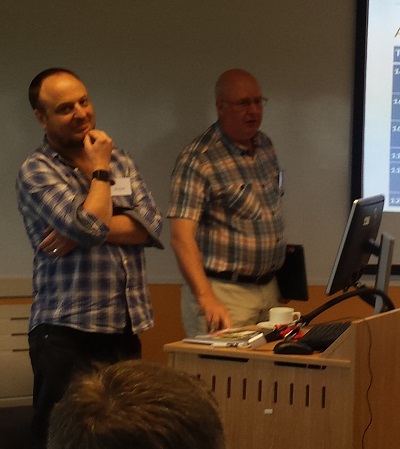Our most recent network event was at the University of South Wales’ campus in Newport. More and more institutions are undertaking learning analytics projects, and the interest seems to be constantly growing – the event was a sell-out. There was a good Welsh contingent this time, and a range of particularly interesting presentations.

Paul Bailey updated us on the latest developments with Jisc’s learning analytics programme [PPT 265kB]. We’ve now had expressions of interest from 82 UK institutions in getting involved. 35 of them are currently engaged in activity. 14 have undertaken the discovery phase, where a hit squad of consultants from either Blackboard or Unicon/Marist visit the institution for three days to assess its readiness for learning analytics. 12 are at “pre-implementation” stage, and 7 are now implementing Jisc’s learning analytics architecture, which enables a range of products from different vendors to be integrated.
 Paul also mentioned our recent report, Learning Analytics in Higher Education: A review of UK and international practice, which outlines some of the evidence for learning analytics across the world.
Paul also mentioned our recent report, Learning Analytics in Higher Education: A review of UK and international practice, which outlines some of the evidence for learning analytics across the world.
Michael Webb was up next [PPT 10Mb] , outlining various technical aspects we’ve been working feverishly on, namely:
- The Unified Data Definitions (UDD) which specify key data for learning analytics that needs to be extracted from student record systems in particular, such as what students are studying and what their grades are
- The xAPI recipes, which specify the format for learning activity data coming from VLEs and other systems with which students interact
Michael also discussed timelines for technical developments and pilots for the rest of this year, and mentioned a new project, Data Explorer, which will allow institutions to extract their data from the Learning Records Warehouse and explore it with provided tools, or their own preferred ones.
Rob Wyn Jones then updated us on how the Welsh language is being integrated into the various products [PPT 7Mb]. Tribal Student Insight, for example, now has both front-end and back-end support for Welsh. Unicon’s Open Dashboard and Student Success Plan, and our student app, are also currently being translated. Meanwhile the UDD (see above) allows bilingual fields to be added.
The final session in the morning was given by Rob from Jisc and Richard Palmer from Tribal, and was about getting your data right for learning analytics [PPT 1Mb] This examined where the data comes from, how it can be transformed, and how predictive models can be created from it. Richard’s top tips for data preparation are:
- Understand where and how you store the information
- Aim for the most robust data, not the easiest to extract
- Understand how administrative processes are represented in your systems
- Consider how you treat special circumstances
After lunch we had a fascinating presentation [PDF 3Mb] from Kevin Mayles of the Open University, who changed his talk on the fly to centre more around data, as there had been so much interest expressed in this subject earlier on. Kevin outlined the OU’s analytics strategy, and its use of the OUAnalyse predictive tool. A sophisticated level of understanding of the reasons for student withdrawal has been developed, and a pilot project of interventions is underway.
 Chris Price was next, talking about Aberystwyth University’s use of attendance monitoring systems [PPT 17Mb], which he believed is a better source of data (at least at Aber) than the VLE, for measuring engagement, and hence risk. Chris’ starting point was:
Chris Price was next, talking about Aberystwyth University’s use of attendance monitoring systems [PPT 17Mb], which he believed is a better source of data (at least at Aber) than the VLE, for measuring engagement, and hence risk. Chris’ starting point was:
Why do we get to week 7, and I am the first person finding out the problems of a fresher who has only been to 10% of his lectures?… And what can we do to change that?
Chris discussed how attendance monitoring devices, costing around £70 each, have been installed in lecture theatres across the campus, enabling students to swipe their cards. These have achieved widespread acceptance by students, and enable much faster response to be made when students are not attending. Students in high risk groups, in particular, can be monitored more closely.
The day’s final presentation was by Cathy Gunn from the University of Auckland. As she was over in the UK, I seized the opportunity to see if she could update us on developments in learning analytics down under [PPT 4Mb] , which she kindly agreed to do. Cathy mentioned a recent Australian report on institutional implementation of learning analytics, where senior leaders in many Australian institutions, and learning analytics experts around the world were surveyed. I subsequently read this and found it quite useful.
The rest of Cathy’s presentation detailed other initiatives in Australia and New Zealand, particularly at Auckland, where attempts have been made to link analytics to learning design, something that I have become increasingly convinced will be essential in the long run.
Despite some particularly appalling weather, Paulette Makepeace and her colleagues provided a great venue at Newport, and I think this was one of our most interesting and useful sessions to date. The next one is at Newman University in Birmingham on 22nd June. Details to follow soon on this blog.

